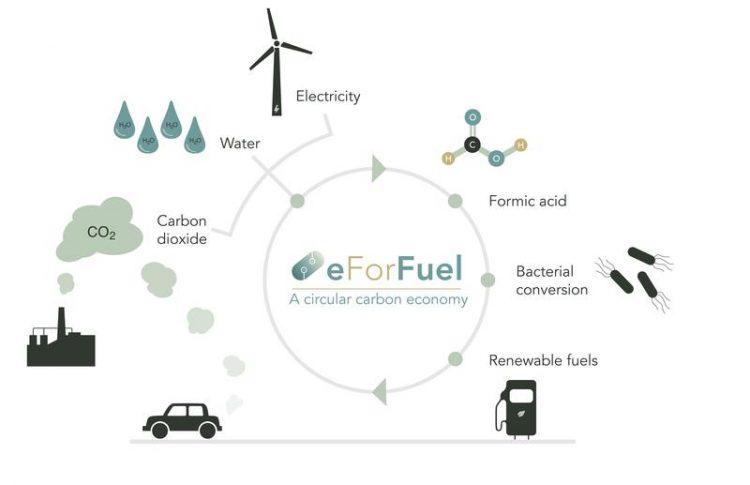eForFuel: Fuels from CO2 and Electricity

eForFuel © Biofaction
eForFuel is a Horizon 2020 EU project launched in March 2018 and scheduled to run for the next 4 years with funding of around 4 million Euros.
The project is led and coordinated by scientists at the Max Planck Institute (MPI) of Molecular Plant Physiology in Germany and boasts the participation of 14 industrial and academic partners from 9 European and associated countries.
eForFuel is a truly interdisciplinary project aiming to achieve its research targets of offering sustainable alternatives to fossil fuels.
Greenhouse gases (especially CO2) emitted from the burning of fossil fuels are significant drivers of climate change and a global threat to society and the environment. Hence, it is very important to replace fossil fuels with an alternative, sustainable sources.
Early generation 'biofuels' compete with land resources, limit agricultural production of food, and, therefore, cannot completely replace fossil fuels without severely undermining food security and decreasing biodiversity.
In order to overcome this problem, eForFuel provides a novel solution to utilize resources that are essentially unlimited and that are independent of land use: CO2, electricity and water.
“What makes eForFuel unique is the sustainable production chain that converts CO2 emissions and renewable electricity into easy to handle formic acid, which is then fed to engineered microbes for the production of renewable hydrocarbon fuels”, says project coordinator Arren Bar-Even from MPI.
eForFuel aims to establish and demonstrate a unique integrated electro-bioreactor, which automatically integrates CO2 electro-reduction, formate production and formate bioconversion to hydrocarbons that can serve as “drop in” fuels. This integrated system will serve as a stepping-stone towards transforming the way we produce fuels and carbon-based chemicals.
“We will support the process developers by continuously providing them with insights gained from life cycle assessment (LCA)”, explains Nils Rettenmaier from the Institute for Energy and Environmental Research Heidelberg (ifeu), leading scientist in the project.
ifeu from Germany will provide a key contribution to eForFuel by taking care of the integrated sustainability assessment. In collaboration with other project partners, the impacts of eForFuel products on the main pillars of sustainability will be assessed.
eForFuel, which was launched in March 2018 in Berlin, is a 4-year project funded by the European Union’s Horizon
Updates can be found at www.eforfuel.eu and on Twitter @eforfuel
Media Contact
All latest news from the category: Life Sciences and Chemistry
Articles and reports from the Life Sciences and chemistry area deal with applied and basic research into modern biology, chemistry and human medicine.
Valuable information can be found on a range of life sciences fields including bacteriology, biochemistry, bionics, bioinformatics, biophysics, biotechnology, genetics, geobotany, human biology, marine biology, microbiology, molecular biology, cellular biology, zoology, bioinorganic chemistry, microchemistry and environmental chemistry.
Newest articles

High-energy-density aqueous battery based on halogen multi-electron transfer
Traditional non-aqueous lithium-ion batteries have a high energy density, but their safety is compromised due to the flammable organic electrolytes they utilize. Aqueous batteries use water as the solvent for…

First-ever combined heart pump and pig kidney transplant
…gives new hope to patient with terminal illness. Surgeons at NYU Langone Health performed the first-ever combined mechanical heart pump and gene-edited pig kidney transplant surgery in a 54-year-old woman…

Biophysics: Testing how well biomarkers work
LMU researchers have developed a method to determine how reliably target proteins can be labeled using super-resolution fluorescence microscopy. Modern microscopy techniques make it possible to examine the inner workings…





















